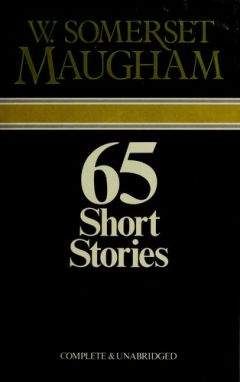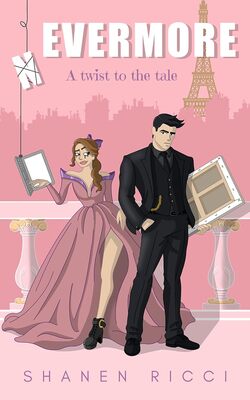Somerset Maugham - Sixty-Five Short Stories

Помощь проекту
Sixty-Five Short Stories читать книгу онлайн
Sometimes she shocked him. He grew accustomed to the frankness with which she admired his looks, and when she told him that he was as beautiful as a young Norse god he did not turn a hair. Flattery fell off him like water from a duck's back. But he did not like it when she ran her hand, though large, very soft, with caressing fingers, through his curly hair or, a smile on her lips, stroked his smooth face. He couldn't bear being mussed about. One day she wanted a drink of tonic water and began pouring some out in a glass that stood on the table.
'That's my glass,' he said quickly. I've just been drinking out of it.'
'Well, what of it? You haven't got syphilis, have you?'
'I hate drinking out of other people's glasses myself.'
She was funny about cigarettes too. Once, when he hadn't been there very long, he had just lit one, when she passed and said:
'I want that.'
She took it out of his mouth and began to smoke it. After two or three puffs, she said she did not want any more and handed it back to him. The end she had had in her mouth was red from the rouge on her lips, and he didn't want to go on smoking it at all. But he was afraid she would think it rude if he threw it away. It somewhat disgusted him. Often she would ask him for a cigarette and when he handed it to her, say:
'Oh, light it for me, will you?'
When he did so, and held it out to her, she opened her mouth so that he should put it in. He hadn't been able to help wetting the end a little. He wondered she could bear to put it in her mouth after it had been in his. The whole thing seemed to him awfully familiar. He was sure Munro wouldn't like it. She had even done this once or twice at the club. Neil had felt himself go purple. He wished she hadn't got these rather unpleasant habits, but he supposed that they were Russian, and one couldn't deny that she was wonderfully good company. Her conversation was very stimulating. It was like champagne (which Neil had tasted once and thought wretched stuff), 'metaphorically speaking'. There was nothing she couldn't talk about. She didn't talk like a man; with a man you generally knew what he would say next, but with her you never did; her intuition was quite remarkable. She gave you ideas. She enlarged your mind and excited your imagination. Neil felt alive as he had never felt alive before. He seemed to walk on mountain peaks, and the horizons of the spirit were unbounded. Neil felt a certain complacency when he stopped to reflect on what an exalted plane his mind communed with hers. Such conversations made very small beer of the vaunted pleasure of sense. She was in many ways (he was of a cautious nature and seldom made a statement even to himself that he did not qualify) the most intelligent woman he had ever met. And besides, she was Angus Munro's wife.
For, whatever Neil's reservations were about Darya, he had none about Munro, and she would have had to be a much less remarkable woman not to profit by the enormous admiration he conceived for her husband. With him Neil let himself go. He felt for him what he had never felt for anyone before. He was so sane, so balanced, so tolerant. This was the sort of man he would himself like to be when he was older. He talked little, but when he did, with good sense. He was wise. He had a dry humour that Neil understood. It made the hearty English fun of the men at the club seem inane. He was kind and patient. He had a dignity that made it impossible to conceive anyone taking a liberty with him, but he was neither pompous nor solemn. He was honest and absolutely truthful. But Neil admired him no less as a scientist than as a man. He had imagination. He was careful and painstaking. Though his interest was in research he did the routine work of the museum conscientiously. He was just then much interested in stick-insects and intended to write a paper on their powers of parthenogenetic reproduction. An incident occurred in connexion with the experiments he was making that made a great impression on Neil. One day, a little captive gibbon escaped from its chain and ate up all the larvae and so destroyed the whole of Munro's evidence. Neil nearly cried. Angus Munro took the gibbon in his arms and, smiling, stroked it.
'Diamond, Diamond,' he said, quoting Sir Isaac Newton, 'you little know the damage you have done.'
He was also studying mimicry and instilled into Neil his absorbed interest in this controversial subject. They had interminable talks about it. Neil was astonished at the Curator's wonderful knowledge. It was encyclopaedic, and he was abashed at his own ignorance. But it was when Munro spoke of the trips into the country to collect specimens that his enthusiasm was most contagious. That was the perfect life, a life of hardship, difficulty, often of privation and sometimes of danger, but rewarded by the thrill of finding a rare, or even a new, species, by the beauty of the scenery, and the intimate observation of nature, and above all the sense of freedom from every tie. It was for this part of the work that Neil had been chiefly engaged. Munro was occupied in research work that made it difficult for him to be away from home for several weeks at a time, and Darya had always refused to accompany him. She had an unreasoning fear of the jungle. She was terrified of wild beasts, snakes, and venomous insects. Though Munro had told her over and over again that no animal hurt you unless you molested or frightened it, she could not get over her instinctive horror. He did not like leaving her. She cared little for the local society and with him away he realized that life for her must be intolerably dull. But the Sultan was keenly interested in natural history and was anxious that the museum should be completely representative of the country's fauna. One expedition Munro and Neil were to make together, so that Neil should learn how to go to work, and the plans for this were discussed by them for months. Neil looked forward to it as he had never looked forward to anything in his life.
Meanwhile he learned Malay and acquired a smattering of the dialects that would be useful to him on future journeys. He played tennis and football. He soon knew everyone in the community. On the football field he threw off his absorption in science and his interest in Russian fiction and gave himself up to the pleasure of the game. He was strong, quick, and active. After it was all over it was grand to have a sluice down and a long tonic with a slice of lemon and go over it all with the other fellows. It had never been intended that Neil should live permanently with the Munros. There was a roomy rest-house at Kuala Solor, but the rule was that no one should stay in it for more than a fortnight and such of the bachelors as had no official quarters clubbed together and took a house between them. When Neil arrived it so happened that there was no vacancy in any of these messes. One evening, however, when he had been about four months in the colony, two men, Waring and Jonson, when they were sitting together after a game of tennis, told him that one member of their mess was going home and if he would like to join them they would be glad to have him. They were young fellows of his own age, in the football team, and Neil liked them both. Waring was in the Customs and Jonson in the police. He jumped at the suggestion. They told him how much it would cost and fixed a day, a fortnight later, when it would be convenient for him to move in.
At dinner he told the Munros.
'It's been awfully good of you to let me stay so long. It's made me very uncomfortable planting myself on you like this, I've been quite ashamed, but now there's no excuse for me.'
'But we like having you here,' said Darya. 'You don't need an excuse.'
'I can hardly go on staying here indefinitely.'
'Why not? Your salary's miserable, what's the use of wasting it on board and lodging? You'd be bored stiff with Jonson and Waring. Stupids. They haven't an idea in their heads outside playing the gramophone and knocking balls about.'
It was true that it had been very convenient to live free of cost. He had saved the greater part of his salary. He had a thrifty soul and had never been used to spending money when it wasn't necessary, but he was proud. He could not go on living at other people's expense. Darya looked at him with her quiet, observant eyes.
'Angus and I have got used to you now. I think we'd miss you. If you like, you can pay us for your board. You don't cost anything, but if it'll make you easier I'll find out exactly what difference you make in cookie's book and you can pay that.'
'It must be an awful nuisance having a stranger in the house,' he answered uncertainly.
'It'll be miserable for you there. Good heavens, the filth they eat.'
It was true also that at the Munros you ate better than anywhere else at Kuala Solor. He had dined out now and then, and even at the Resident's you didn't get a very good dinner. Darya liked her food and kept the cook up to the mark. He made Russian dishes which were a fair treat. That cabbage soup of Darya's was worth walking five miles for. But Munro hadn't said anything.
'I'd be glad if you'd stay here,' he said now. 'It's very convenient to have you on the spot. If anything comes up we can talk it over there and then. Waring and Jonson are very good fellows, but I dare say you'd find them rather limited after a bit.'
'Oh, well, then I'll be very pleased. Heaven knows, I couldn't want anything better than this. I was only afraid I was in the way.'
Next day it was raining cats and dogs and it was impossible to play tennis or football, but towards six Neil put on a mackintosh and went to the club. It was empty but for the Resident, who was sitting in an arm-chair reading The Fortnightly. His name was Trevelyan, and he claimed to be related to the friend of Byron. He was a tall fat man, with close-cropped white hair and the large red face of a comic actor. He was fond of amateur theatricals and specialized in cynical dukes and facetious butlers. He was a bachelor, but generally supposed to be fond of the girls, and he liked his gin pahit before dinner. He owed his position to the Sultan's friendship. He was a slack, complacent man, a great talker, not very fond of work, who wanted everything to go smoothly and no one to give trouble. Though not considered especially competent he was popular in the community because he was easy-going and hospitable, and he certainly made life more comfortable than if he had been energetic and efficient. He nodded to Neil.
'Well, young fellow, how are bugs today?'
'Feeling the weather, sir,' said Neil gravely.
'Hi-hi.'
In a few minutes Waring, Jonson, and another man, called Bishop, came in. He was in the Civil Service. Neil did not play bridge, so Bishop went up to the Resident.
'Would you care to make a fourth, sir?' he asked him. 'There's nobody much in the club today.'
The Resident gave the others a glance.
'All right. I'll just finish this article and join you. Cut for me and deal. I shall only be five minutes.'
Neil went up to the three men.
'Oh, I say, Waring, thanks awfully, but I can't move over to you after all. The Munros have asked me to stay on with them for good.'
A broad smile broke on Waring's face.
'Fancy that.'
'It's awfully nice of them, isn't it? They made rather a point of it. I couldn't very well refuse.'
'What did I tell you?' said Bishop.
'I don't blame the boy,' said Waring.
There was something in their manner that Neil did not like. They seemed to be amused. He flushed.
'What the hell are you talking about?' he cried.
'Oh, come off it,' said Bishop. 'We know our Darya. You're not the first good-looking young fellow she's had a romp with, and you won't be the last.'























